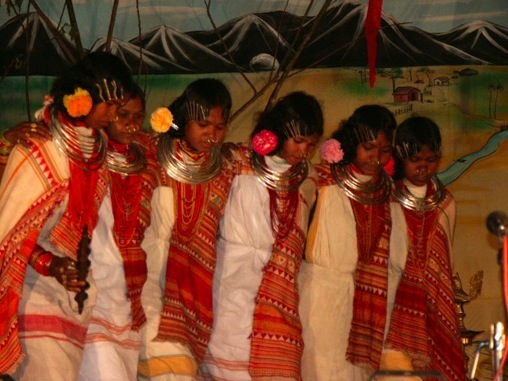Dhangda-Dhangdi Geet

The Kondhs and Parajas stay in Koraput and Kalahandi districts of Odisha and are found in fewer numbers in other districts too. They have specific spaces in their villages for the youths to stay and socialize.
In both communities the young unmarried men are called dhangdas and the young females are called dhangdis. They live separately from the houses of their parents, in dormitories specifically meant for them. The Kondhs call these places dhanger basa.
This basa holds a significant place in the Kondh and Paraja community life as the youngsters learn the art of socialization, songs and dances while living here. It also serves as a place to develop romantic relationships between the boys and girls through mutual courtship.
The dhangda-dhangdi songs are the songs that the youngsters sing to each other. It is a common practice for the dhangda to sing a song and play the flute or dung-dunga to a dhangdi staying in the girls’ dormitory. He may use a secret name specifically meant for her. To this the dhangdi may reply with another song and this exchange of songs may go all night long.
The girls and boys may reply to each other’s songs in groups or may also sing alone but occasionally. The names used for the beloved are secret to the lovers some of them being Nilas, Talas, Lembar and Dumbar.

The songs are in the form of questions and answers. They are often songs of promise, of love, future happiness and security. They are also songs of passion as the dhangdis express their desire for a strong and courageous dhangda while the dhangdas want a vigorous and healthy dhangdi.
The ability and the stamina to sing and dance for a long time is looked for by both dhangdas and dhangdis given that all social functions of the Kondhs and Parajas involve these cultural forms. Therefore the basas are important places for the young men and women to learn the art and etiquette of their respective community.
Come, My Rhythmic Fury
DHANGDA
Play the sarangi,
Dance and sing,
Hand in hand twist and turn,
Beat the rhythm, beat your feet,
Lose yourself in the ecstasy of the dance,
Come out of the dormitory,
Come with me,
We will go away,
Go away to a distant land.
DHANGDI
Truly do you ask me
To leave this village
And go away to a distant land?
But this is our ancestor’s village.
Here the home of mother’s brother,
Of father’s father.
Tell me how do I cut myself away
To a new land
To a new house,
To my father-in-law’s.
(The Awakened Wind, Sitakant Mahapatra)
Links– Meriah Dhap Changu Nata Podhmara Toki Parab